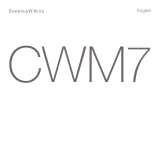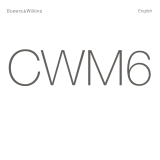
4. Installing CCM6 Series Speakers
To install a CCM6 Series speaker proceed as
described in the following paragraphs:
4.1 Using the supplied cut-out template, mark a
cut line on the existing ceiling. Check the cut line
denes the correct diameter. Cut along the line with
an appropriate tool to create a round aperture in the
ceiling.
Note: Ensure that there is enough free space
internally adjacent to the aperture for the spring
clamps.
Note: To reduce the possibility of the ceiling buzzing
or rattling, adhesive mastic can be applied between
the studs and sheetrock in the vicinity of the
speaker aperture.
4.2 If speaker cable is already present in the ceiling
space, pull the cable down through the aperture. If
speaker cables are not already installed this should be
done at this stage. It is likely that you will need to gain
access through the oor above to route the cables
through the ceiling space.
Leave enough spare cable through the aperture to
ease connection to the speaker back box, but not so
much that it is likely to buzz or rattle when pushed
back up into the ceiling space. Approximately 1.0m
(3 ft) is appropriate.
Note: Always use high quality, low resistance
speaker cable. Low resistance is especially
important if the length of cable from amplifier to
speaker exceeds 5m. Your local Bowers & Wilkins
retailer will be able to offer advice on speaker cable
selection if required.
4.3 Now connect the speaker cable to the spring
terminals on the side of the frame. Ensure that the
speaker connection polarity is correct: the cable
connected to the positive terminal on the amplier
should be connected to the red spring terminal on the
frame. Similarly, the cable connected to the negative
terminal on the amplier should be connected to the
black spring terminal on the frame. The diagram above
illustrates cable connection.
When connecting a CCM664SR or CCM663SR in
surround mode, simply connect the speaker cable to
either the left or right set of terminals. Please ensure
that the switch on the back is set to surround.
Note: If an amplifier is already connected to the
cable it should be switched off while connections
are being made to the frame.
4.4 With the frame connected it may be lifted up into
the ceiling aperture. On speakers with tilting tweeters,
correct frame orientation must be established at this
stage: the red arrow on the frame ange should be
pointing towards the listening area.
Ensure that the four QuickDog™ (spring clamps) are
rotated so that they will pass through the aperture
then lift the frame up so that the ange is ush on the
ceiling. Take care that the cable is not trapped. Now
reach inside the aperture with one hand, rotate the
QuickDogs™ outwards and, using two ngers and
thumb, pull each QuickDog™ downwards so that the
frame is xed securely. The diagram above illustrates
insertion of the frame.
Note: To release a QuickDog™ push the metal tab,
located just below the finger platform, upwards.
CCM663SR - CCM664SR
SURROUND
STEREO















